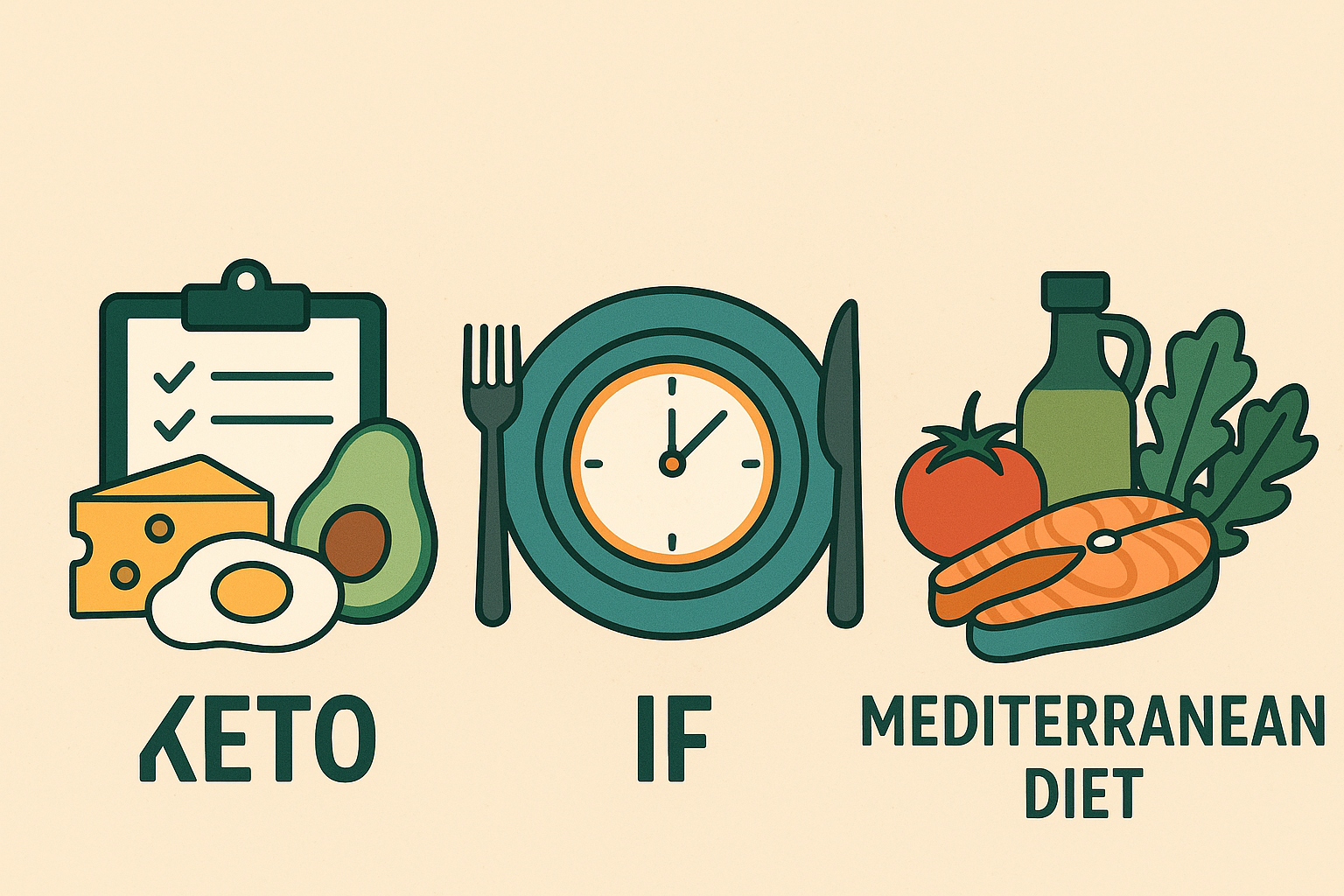At askdoctor.ai, you will get complete knowledge about struggling to find a diet that works long-term weight loss journey. In this guide, we break down three of the most popular — and science-backed — eating patterns: Keto, Intermittent Fasting (IF), and the Mediterranean Diet. We’ll compare their pros, cons, and real-world sustainability to help you figure out what truly fits your lifestyle.
What is Keto: How it Works in Weight Loss
The ketogenic (or “keto”) diet is a high-fat, very low-carbohydrate eating plan that shifts the body’s metabolism into a state called ketosis. Normally, your body relies on carbohydrates for energy. But when carb intake is drastically reduced—typically to around 20–50 grams per day—your liver begins converting fat into ketones, an alternative fuel source.
This shift in fuel can have several effects on weight loss:
- Fat Burn: Since your body is using fat for energy, stored body fat may be broken down more efficiently.
- Appetite Suppression: Many people on keto report feeling less hungry, likely due to ketones and the satiating effect of dietary fats.
- Lower Insulin Levels: Keto can improve insulin sensitivity, which helps reduce fat storage and supports better blood sugar control.
However, keto isn’t magic—it works best when combined with overall calorie awareness and whole, nutrient-dense foods. While it can lead to rapid weight loss in the beginning (often due to water loss), long-term success depends on how sustainable it is for your lifestyle.
Pros of Keto for Weight Loss
- Fast Initial Weight Loss: Especially in the first few weeks due to water loss and reduced carbs
- Promotes Fat Burning: Encourages the body to use fat (including stored fat) as its primary fuel source
- Reduced Appetite: High fat and protein intake often leads to greater satiety and fewer cravings
- Stabilizes Blood Sugar: May improve insulin sensitivity and reduce blood sugar spikes
Mental Clarity: Some people report increased focus and energy once in ketosis
Cons of Keto for Weight Loss
- Restrictive Food Choices: Eliminates many fruits, grains, and legumes, which can be hard to sustain
- Keto Flu: Temporary fatigue, brain fog, and irritability can occur during the body’s adjustment phase
- Nutrient Deficiencies: Potential for low intake of fiber, vitamins, and minerals if not well planned
- Not Ideal for All Lifestyles: May hinder performance in high-intensity workouts or be unsuitable for certain health conditions
- Social Limitations: Can be challenging to follow at restaurants, family gatherings, or events
Who Keto Might Work For
The ketogenic diet isn’t a one-size-fits-all approach, but it can be a powerful tool for certain individuals, especially in the early phases of weight loss. Keto may be a good fit for:
- People with Short-Term Fat Loss Goals: If you’re looking to kickstart your weight loss or break through a plateau, keto can help reduce body fat quickly—especially in the first few weeks.
- Individuals with Insulin Resistance or Type 2 Diabetes: By reducing carb intake, keto can help stabilize blood sugar and improve insulin sensitivity (always consult your doctor first).
- Those Who Prefer High-Fat, Low-Carb Foods: If you enjoy foods like eggs, cheese, avocado, olive oil, and meats, keto can feel more satisfying and easier to maintain.
- People Who Thrive on Routine: Keto’s strict structure may appeal to those who do well with clear guidelines and fewer food choices.
That said, keto isn’t ideal for everyone—especially those who prefer a more balanced or flexible way of eating. Always match the plan to your lifestyle, not the trend.
What is Intermittent Fasting: How it Works in Weight Loss
Intermittent Fasting (IF) is not a diet in the traditional sense—it’s an eating pattern that alternates between periods of eating and fasting. Instead of focusing on what you eat, IF focuses on when you eat.
The most popular methods include:
16:8 method: Fast for 16 hours, eat within an 8-hour window (e.g., 12–8 PM)
5:2 method: Eat normally 5 days a week, reduce calories to 500–600 for 2 non-consecutive days
OMAD (One Meal a Day): Eat one large meal during a 1-hour window
How IF Supports Weight Loss:
- Calorie Control: By reducing the eating window, many people naturally eat fewer calories
- Fat Burning Boost: During fasting, insulin levels drop and the body shifts to using stored fat for energy
- Hormonal Balance: IF may increase norepinephrine and growth hormone, which can enhance metabolism
- Appetite Regulation: Some people experience fewer cravings and better hunger awareness over time
IF works well when paired with balanced, nutritious meals and can fit into many lifestyles without strict food restrictions. But it’s not for everyone—especially those with a history of disordered eating or blood sugar issues.
Intermittent Fasting: The Cellular Benefits of IF (Methods, Side Effects, and Real-Life Stories)
Pros of IF for Weight Loss
- Encourages Fat Burning: During fasting periods, insulin levels drop, prompting the body to use stored fat for energy, which may support fat loss over time.
- Simplifies Eating: IF focuses on when you eat, not what you eat—making it easier for some people to follow without obsessing over calorie counting or meal prep.
- May Reduce Calorie Intake Naturally: Limiting the eating window often leads to fewer meals and snacks, which can reduce overall calorie consumption without intentional restriction.
- Supports Hormonal Balance: IF may increase levels of human growth hormone (HGH) and norepinephrine, both of which can aid fat loss and improve metabolic function.
- Boosts Metabolic Flexibility: IF can train the body to switch more efficiently between using carbs and fat for fuel, which may improve energy levels and endurance.
- Reduces Late-Night Snacking: Time-restricted eating can help eliminate mindless nighttime eating, a common source of excess calories.
- Potential Health Benefits: Early studies suggest IF may also support insulin sensitivity, heart health, and cellular repair processes like autophagy.
Cons of IF for Weight Loss
- Loss of Muscle Mass (if not balanced): Extended fasting or very low-calorie intake can lead to muscle loss, particularly if protein intake isn’t prioritized or exercise isn’t maintained.
- Hunger and Irritability: During fasting periods, many people experience hunger, irritability, and fatigue, especially when starting out or adjusting to a new eating window.
- Energy Slumps: Some individuals feel low energy or brain fog, particularly during the fasting phase, making it challenging to stay productive or focused.
- Difficult to Maintain Socially: IF can be tough to follow at social gatherings, family meals, or events where food is served outside of your eating window.
- Potential for Overeating: With a limited eating window, some people may overeat or make poor food choices, thinking they need to “make up” for the fasting period, which can negate weight loss benefits.
- Not Suitable for Everyone: Those with certain health conditions (e.g., diabetes, eating disorders) or those who are pregnant/breastfeeding should consult a healthcare provider before starting IF.
- Disrupts Sleep for Some: IF can affect sleep patterns, especially if eating late at night, leading to trouble falling asleep or staying asleep.
Though IF is highly effective for many, it’s essential to find an eating plan that aligns with your body and lifestyle for long-term success.
Who Intermittent Fasting (IF) Might Work for
Intermittent Fasting can be particularly effective for individuals who thrive under structured yet flexible eating patterns. It may be a great fit for:
- Busy Individuals: If you have a hectic schedule and don’t have time to prepare multiple meals throughout the day, IF’s time-restricted eating can simplify your routine. With fewer meals to plan for, IF fits seamlessly into work or travel schedules.
- Those Who Prefer Structure Without Strict Diet Changes: Unlike traditional diets that require constant calorie counting or meal prep, IF provides an easy-to-follow eating window, which is great for people who want a simple, effective plan without drastic food restrictions. It allows flexibility in food choices while still fostering weight loss.
- Those Looking for Simplicity: If you’re overwhelmed by the idea of traditional dieting, IF might work as it doesn’t focus on specific foods but on the timing of eating. It’s easy to incorporate into everyday life without complicated meal planning.
- Active Individuals Who Want Flexibility: IF can be ideal for those who are active but don’t want to obsess over their meals. It gives flexibility to eat nutrient-dense foods without a rigid diet structure.
Intermittent fasting works for those who can commit to an eating window but may not be ideal for those who need constant grazing throughout the day.
What is the Mediterranean Diet: How it Works in Weight Loss Journey?
The Mediterranean Diet is inspired by the traditional eating patterns of countries bordering the Mediterranean Sea—such as Greece, Italy, and Spain. It emphasizes whole, minimally processed foods rich in nutrients, healthy fats, and fiber.
What’s on the Menu?
- Fresh vegetables and fruits
- Whole grains (like brown rice, oats, quinoa)
- Healthy fats (especially olive oil, nuts, and seeds)
- Lean proteins (especially fish, legumes, and poultry)
- Limited red meat, sugar, and processed foods
- Occasional red wine and plenty of water
How It Supports Weight Loss:
- Naturally Satisfying: High fiber, healthy fats, and protein help keep you full longer and reduce overeating.
- Reduces Inflammation: The diet is rich in antioxidants and anti-inflammatory foods, which can support metabolism and reduce fat storage.
- Encourages Calorie Balance Without Counting: Because it’s rich in nutrient-dense, low-calorie foods, many people naturally consume fewer calories without strict tracking.
- Supports Long-Term Habits: The variety and flexibility make it easier to stick with, leading to more sustainable weight loss over time.
Pros of the Mediterranean Diet
- Nutrient-Dense & Satisfying: Rich in fiber, healthy fats, and lean proteins that help keep you full and satisfied, reducing the urge to overeat.
- Heart-Healthy & Science-Backed: Decades of research link this diet to reduced risk of heart disease, stroke, and metabolic syndrome.
- Flexible & Enjoyable: Encourages variety and allows for occasional treats like wine or sweets—making it easier to stick with long term.
- Anti-Inflammatory Benefits: Packed with antioxidants and omega-3s that may reduce inflammation and support metabolism.
- Focuses on Whole Foods: Promotes real, minimally processed ingredients that naturally support weight loss and health.
- Family & Social Friendly: It’s easy to prepare and share meals with others, helping you stay consistent without isolation.
Cons of the Mediterranean Diet
- Can Be Expensive: High-quality olive oil, fresh fish, nuts, and organic produce can add up.
- Meal Prep Takes Time: Cooking from scratch and using whole ingredients requires more time and planning than convenience diets.
- Slow & Steady Results: Weight loss may be more gradual compared to low-carb or calorie-restrictive plans—and requires patience.
- Carb Content May Be Too High for Some: While healthy, whole grains and legumes may not suit low-carb or insulin-sensitive individuals.
- Less Structured: Doesn’t have strict rules or calorie targets, which may be confusing or ineffective for people who need clear guidance.
Who Mediterranean Diet Might Work for
The Mediterranean Diet is one of the most sustainable and enjoyable eating patterns, making it a great fit for:
- People Focused on Long-Term Health: If your goal goes beyond just weight loss—like reducing the risk of heart disease, improving cholesterol, or aging well—this diet is packed with proven benefits backed by decades of research.
- Food Lovers Who Value Variety: Love cooking, tasting new flavors, and enjoying meals without feeling restricted? The Mediterranean approach celebrates fresh ingredients, seasonal produce, herbs, and healthy fats—making healthy eating genuinely enjoyable.
- Families and Social Eaters: With its inclusive, whole-food approach, this diet is easy to follow with kids, partners, or guests. Meals are simple to share, making it great for households or those who prefer to eat together.
- Those Seeking Balance Over Perfection: This isn’t a “quick fix” plan—it’s for people ready to embrace a nourishing lifestyle that supports gradual, lasting change.

Image by -Rita-👩🍳 und 📷 mit ❤ from Pixabay
Side-by-Side Comparison Table
| Feature | Keto | Intermittent Fasting | Mediterranean Diet |
| Weight Loss Speed | Fast (initially) | Moderate | Gradual |
| Sustainability | Moderate to low | Moderate | High |
| Meal Flexibility | Low | High | High |
| Research Backing | Moderate | Growing | Extensive |
| Best For | Quick fat loss | Simplicity & Flexibility | Overall health |
Final Thoughts – Which Diet Wins?
- There’s no one-size-fits-all answer — each body and lifestyle is different.
- Choose a diet that fits your daily routine, food preferences, and long-term goals.
- Keto is ideal for those who enjoy structure and higher-fat, low-carb meals.
- Intermittent Fasting works well for busy people who prefer time-based eating over food restrictions.
- The Mediterranean Diet suits those who enjoy flavorful, whole-food meals and long-term health benefits.
- Consistency is more important than perfection — small, lasting changes lead to sustainable results.
- Always consider speaking with a registered dietitian or doctor before starting a new eating plan. Especially if you have underlying health conditions.
Real-Life Success Stories
Toil is Gold`s Success Story through Keto
Pros
I’ve lost 40-lbs after 4 months. Old clothes fit me again and no more ankle pain. One thing that gets me psyched though is how well I’ve managed to adapt keto into my life; I’ve learned some great recipes that keep me satiated and fulfilled, and worked out a meal plan that suits me any day of the week.
Cons
I haven’t experienced any of these fabled “mind clarity powers” some people have talked about though. If anything, my head feels worse some of the time whenever I get lazy with my electrolyte upkeep. But, as long as I do keep up with my electrolytes, I feel fine most of the time.
Dreams Do Come True: 6 Months Mediterranean Diet Success
6 months of Mediterranean diet success
5 Weight Loss Stories You Won’t Believe









Leave a Reply